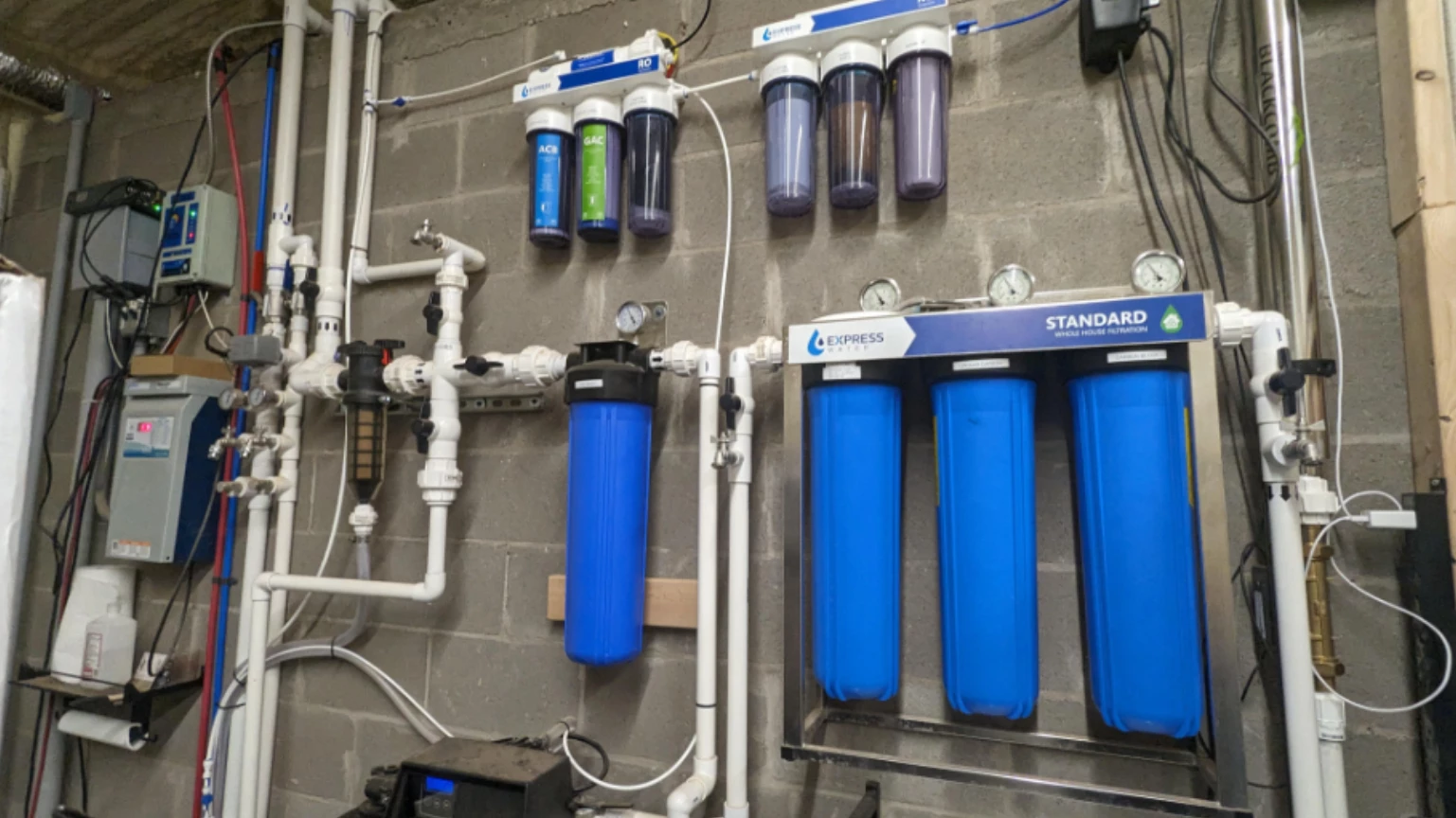Clean water isn’t just essential for your health—it’s a lifeline for the environment, too. Installing a water filtration system in your home doesn’t just improve the quality of your drinking water; it also has a broader impact on local ecosystems.
By reducing pollutants and minimizing the chemicals flushed into our waterways, filtration systems help protect nearby rivers, lakes, and wildlife. They also reduce plastic waste from single-use water bottles, which often end up in landfills or polluting natural habitats.
How do water filtration system installations affect local water quality?
Water filtration systems are becoming increasingly popular for homeowners looking to improve the quality of their drinking water. Beyond personal benefits, these systems can also impact local water quality and the broader community.
- Improved Household Water Quality
Filtration systems remove contaminants like chlorine, heavy metals, and bacteria from tap water, ensuring safer and cleaner water for drinking, cooking, and bathing. - Reduced Dependence on Bottled Water
With access to clean, filtered water at home, people rely less on bottled water, reducing plastic waste and its environmental impact on local ecosystems. - Minimized Pollutants in Wastewater
Filtration systems can prevent certain contaminants from entering wastewater systems, as fewer harmful substances are washed down the drain, potentially improving the quality of water processed at local treatment plants. - Awareness of Water Issues
Installing a filtration system can raise awareness about water quality concerns, encouraging communities to support initiatives that protect local water sources. - Encouragement for Sustainable Practices
When more households install filtration systems, it fosters a culture of sustainability by promoting better water management and reducing strain on municipal water systems.
Water filtration system installations benefit not just individual households but the broader community by enhancing water quality, reducing waste, and fostering sustainability. By investing in these systems, homeowners play an active role in protecting local water sources and promoting a cleaner environment for everyone.
What are the environmental benefits of professional water filtration system installations?
Professional water filtration system installations offer several environmental benefits by promoting sustainable water usage, reducing waste, and protecting local ecosystems. Here are some key advantages:
- Reduction in Plastic Waste: By installing a water filtration system, homeowners and businesses can reduce their reliance on bottled water, significantly decreasing plastic waste. This helps minimize the environmental impact of plastic production, transportation, and disposal, contributing to less pollution in landfills and oceans.
- Conservation of Water Resources: Water filtration systems can make local water sources more usable and safe, reducing the need to over-extract water from natural bodies like rivers and lakes. By improving available water quality, these systems promote more efficient use of water resources, helping protect fragile ecosystems.
- Improved Water Efficiency: With advanced filtration technology, systems often reduce the need for chemical treatment processes, which can be energy-intensive and generate waste products. By filtering water at the point of use, professional installations reduce the demand for large-scale municipal water treatment plants, thus saving energy and reducing carbon emissions.
- Protection of Aquatic Ecosystems: Water filtration systems improve water quality by removing harmful contaminants like heavy metals, chemicals, and pathogens, helping to preserve local ecosystems. Cleaner water also supports aquatic life and biodiversity by preventing pollution from entering rivers, lakes, and groundwater supplies.
- Reduction in Chemical Usage: Many water filtration systems reduce the need for chemical treatments, such as chlorine or fluoride, often used in municipal water systems. This not only lowers chemical waste but also prevents these substances from entering the environment, which can have detrimental effects on human health and local ecosystems.
Professional water filtration system installations contribute to a healthier environment and promote long-term sustainability by providing cleaner water while conserving resources and reducing waste.
Can water filtration systems influence the health of nearby ecosystems?
Yes, water filtration systems can significantly influence the health of nearby ecosystems by improving the quality of water that is returned to local water sources or used for irrigation. Here’s how:
- Reduction in Contaminants: Water filtration systems prevent harmful contaminants such as heavy metals, pesticides, pharmaceuticals, and bacteria from entering rivers, lakes, and groundwater by removing them. Untreated water pollution can disrupt ecosystems by harming aquatic life, reducing biodiversity, and degrading water quality. Cleaner water supports healthier habitats for fish, plants, and other wildlife.
- Preservation of Aquatic Life: Many pollutants, like excess nutrients (e.g., nitrates or phosphates), can lead to algal blooms that deplete oxygen levels in water, creating dead zones where aquatic life cannot survive. Water filtration helps prevent nutrient overload, improve oxygen levels, and maintain a balanced ecosystem. This directly benefits aquatic species that rely on stable, clean environments to thrive.
- Protection of Wetlands and Shoreline Areas: Filtration systems that remove sediment and organic matter reduce debris entering wetlands, shorelines, and coastal areas. These regions are vital for filtering water naturally and providing habitat for many species. By preventing pollution from reaching these sensitive areas, filtration systems help maintain their ecological functions.
- Enhancing Groundwater Quality: Filtration systems contribute to the health of groundwater aquifers by purifying water that flows back into the ground or through irrigation systems. These aquifers are critical sources of fresh water for ecosystems and communities. Clean groundwater supports vegetation and wildlife, ensuring the sustainability of surrounding ecosystems.
In this way, water filtration systems play a crucial role in maintaining the health of ecosystems by reducing water pollution, protecting aquatic species, and preserving natural habitats.
How do water filtration systems help reduce contaminants in local habitats?
Water filtration systems help reduce contaminants in local habitats by removing harmful substances from water before they enter natural water sources, such as rivers, lakes, and groundwater. Here’s how these systems contribute to cleaner environments:
- Removal of Chemical Pollutants: Water filtration systems are designed to remove harmful chemicals, including pesticides, heavy metals, chlorine, and industrial by-products. If allowed to enter local water habitats, these substances can poison aquatic life and disrupt ecosystems. Filtration helps to eliminate these contaminants, ensuring that the water released back into the environment is cleaner and safer for plants, animals, and microorganisms.
- Reduction of Nutrient Pollution: Excess nutrients, particularly nitrogen and phosphorus from agricultural runoff, can lead to eutrophication, which causes algal blooms and depletes oxygen levels in water, harming fish and other aquatic species. Filtration systems help reduce these nutrients, preventing the degradation of local aquatic habitats by maintaining better oxygen levels and water quality.
- Eliminating Pathogens: Water filtration systems also remove harmful pathogens like bacteria, viruses, and parasites that can harm humans and wildlife. By improving water quality and reducing the presence of these pathogens, filtration systems help protect local ecosystems from diseases and disruptions caused by contaminated water.
- Prevention of Plastic and Microplastic Pollution: Many water filtration systems include filters capable of removing microplastics, which can accumulate in water sources and negatively affect aquatic organisms. These systems reduce pollution and contribute to healthier habitats for marine life and other wildlife by preventing microplastics from entering the water supply.
Water filtration systems help protect the health of local habitats by effectively reducing contaminants. This ensures that aquatic ecosystems and the surrounding environments remain safe, clean, and sustainable for the species that depend on them.
Protect Local Ecosystems with Expert Water Filtration Installations!
At Well Doctor LLC, we are dedicated to improving your water quality and the health of local ecosystems. Our expert water filtration installations remove harmful contaminants such as bacteria, heavy metals, and chemicals, ensuring cleaner water for your home while reducing pollution in nearby rivers, lakes, and groundwater.
By installing a high-quality water filtration system, you not only protect your family’s health but also contribute to the preservation of surrounding natural habitats. Contact Well Doctor LLC today to learn how our professional installations can positively impact your environment and water quality!

